Exploration of Business Information Systems in Commercial Airlines
VerifiedAdded on 2022/08/21
|17
|4889
|16
Literature Review
AI Summary
This literature review provides a critical analysis of Business Information Systems (BIS) within the commercial airline industry. The report explores the evolution of BIS, highlighting its impact on various aspects of airline operations including flight control, GPS navigation, and maintenance. The analysis covers key business processes such as passenger services, aircraft maintenance, and cargo operations, as well as the implications of BIS-based systems on efficiency and customer experience. The review also examines the use of online ticketing systems, cybersecurity threats, and the impact of BIS on aviation finance. The study emphasizes the importance of technology in enhancing service delivery, addressing issues like rising oil prices and security regulations, and the need for continuous technological advancements to meet customer demands. The review includes a critical evaluation of existing literature, identifying research gaps and providing insights into the future of BIS in the aviation sector. The review also examines the adoption rates of BIS, the impact on customer service and satisfaction, and the role of BIS in improving the overall efficiency and profitability of commercial airlines.
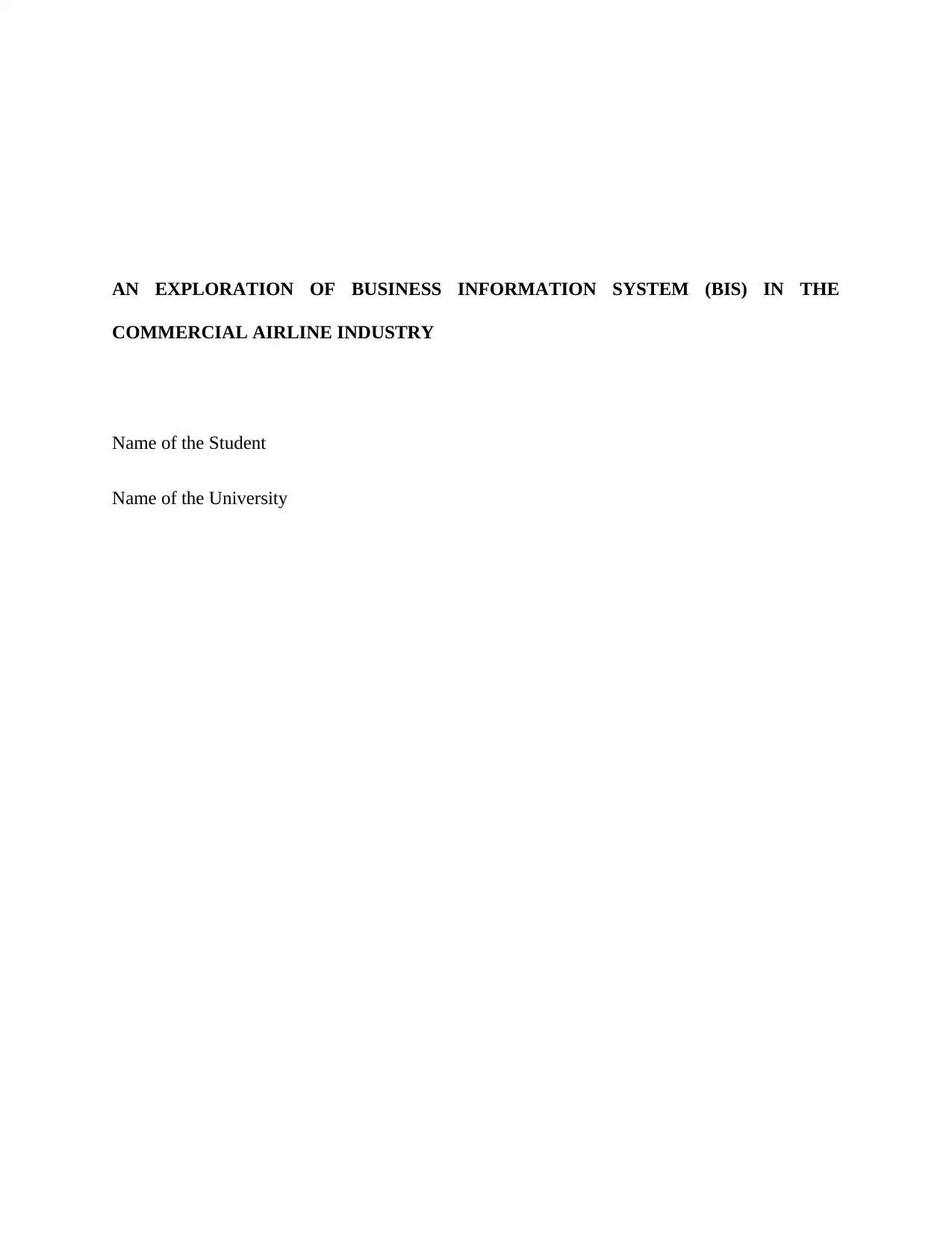
AN EXPLORATION OF BUSINESS INFORMATION SYSTEM (BIS) IN THE
COMMERCIAL AIRLINE INDUSTRY
Name of the Student
Name of the University
COMMERCIAL AIRLINE INDUSTRY
Name of the Student
Name of the University
Paraphrase This Document
Need a fresh take? Get an instant paraphrase of this document with our AI Paraphraser
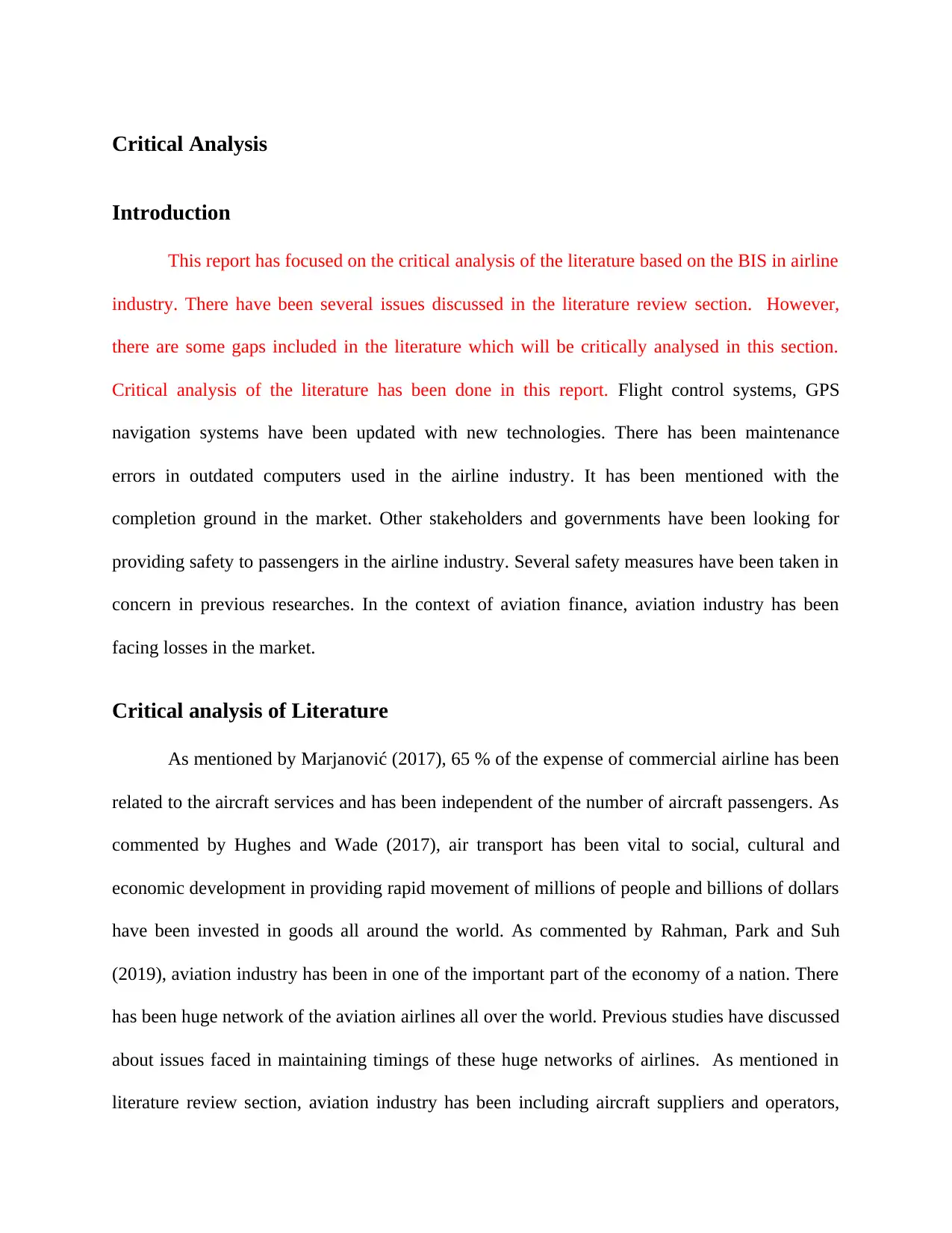
Critical Analysis
Introduction
This report has focused on the critical analysis of the literature based on the BIS in airline
industry. There have been several issues discussed in the literature review section. However,
there are some gaps included in the literature which will be critically analysed in this section.
Critical analysis of the literature has been done in this report. Flight control systems, GPS
navigation systems have been updated with new technologies. There has been maintenance
errors in outdated computers used in the airline industry. It has been mentioned with the
completion ground in the market. Other stakeholders and governments have been looking for
providing safety to passengers in the airline industry. Several safety measures have been taken in
concern in previous researches. In the context of aviation finance, aviation industry has been
facing losses in the market.
Critical analysis of Literature
As mentioned by Marjanović (2017), 65 % of the expense of commercial airline has been
related to the aircraft services and has been independent of the number of aircraft passengers. As
commented by Hughes and Wade (2017), air transport has been vital to social, cultural and
economic development in providing rapid movement of millions of people and billions of dollars
have been invested in goods all around the world. As commented by Rahman, Park and Suh
(2019), aviation industry has been in one of the important part of the economy of a nation. There
has been huge network of the aviation airlines all over the world. Previous studies have discussed
about issues faced in maintaining timings of these huge networks of airlines. As mentioned in
literature review section, aviation industry has been including aircraft suppliers and operators,
Introduction
This report has focused on the critical analysis of the literature based on the BIS in airline
industry. There have been several issues discussed in the literature review section. However,
there are some gaps included in the literature which will be critically analysed in this section.
Critical analysis of the literature has been done in this report. Flight control systems, GPS
navigation systems have been updated with new technologies. There has been maintenance
errors in outdated computers used in the airline industry. It has been mentioned with the
completion ground in the market. Other stakeholders and governments have been looking for
providing safety to passengers in the airline industry. Several safety measures have been taken in
concern in previous researches. In the context of aviation finance, aviation industry has been
facing losses in the market.
Critical analysis of Literature
As mentioned by Marjanović (2017), 65 % of the expense of commercial airline has been
related to the aircraft services and has been independent of the number of aircraft passengers. As
commented by Hughes and Wade (2017), air transport has been vital to social, cultural and
economic development in providing rapid movement of millions of people and billions of dollars
have been invested in goods all around the world. As commented by Rahman, Park and Suh
(2019), aviation industry has been in one of the important part of the economy of a nation. There
has been huge network of the aviation airlines all over the world. Previous studies have discussed
about issues faced in maintaining timings of these huge networks of airlines. As mentioned in
literature review section, aviation industry has been including aircraft suppliers and operators,
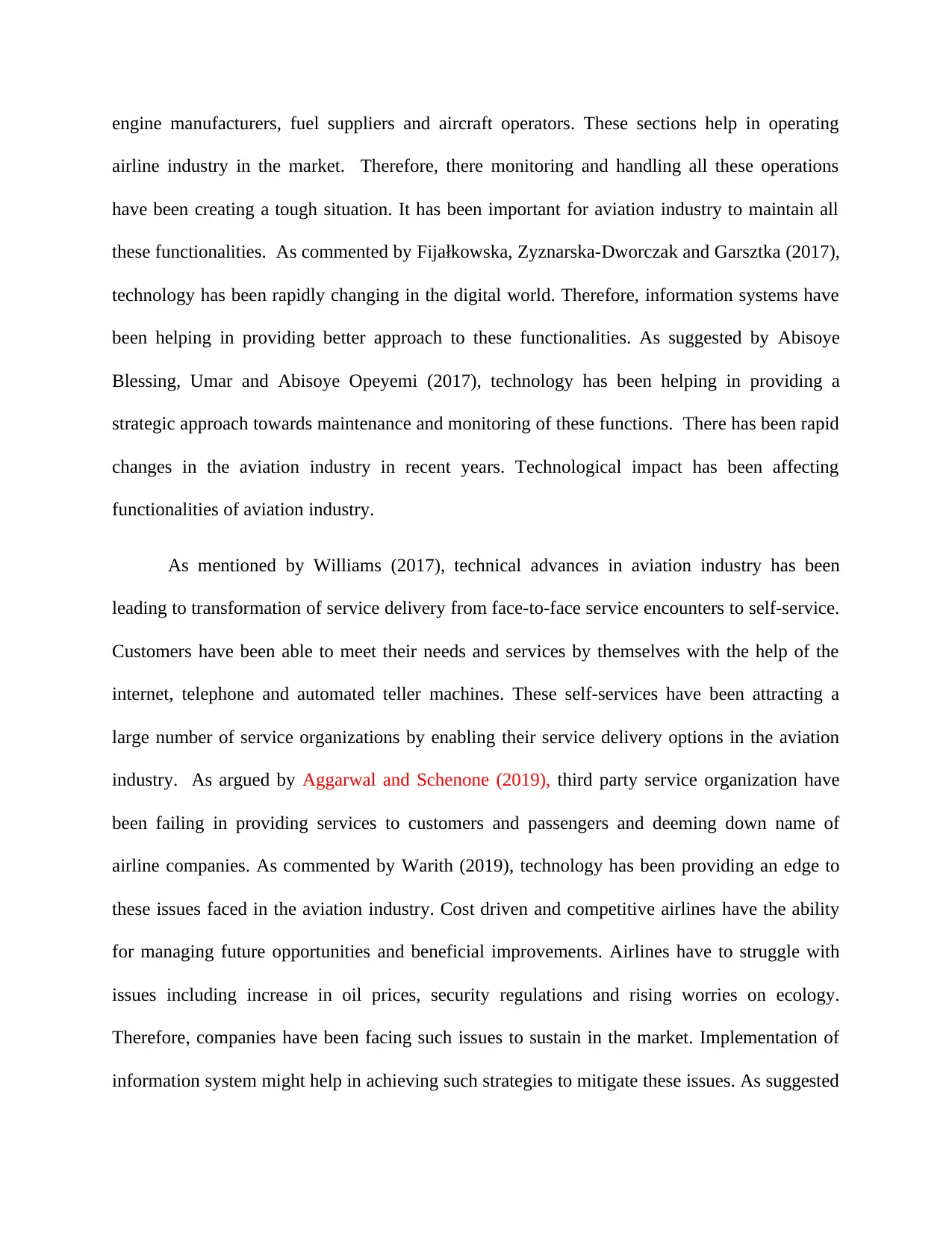
engine manufacturers, fuel suppliers and aircraft operators. These sections help in operating
airline industry in the market. Therefore, there monitoring and handling all these operations
have been creating a tough situation. It has been important for aviation industry to maintain all
these functionalities. As commented by Fijałkowska, Zyznarska-Dworczak and Garsztka (2017),
technology has been rapidly changing in the digital world. Therefore, information systems have
been helping in providing better approach to these functionalities. As suggested by Abisoye
Blessing, Umar and Abisoye Opeyemi (2017), technology has been helping in providing a
strategic approach towards maintenance and monitoring of these functions. There has been rapid
changes in the aviation industry in recent years. Technological impact has been affecting
functionalities of aviation industry.
As mentioned by Williams (2017), technical advances in aviation industry has been
leading to transformation of service delivery from face-to-face service encounters to self-service.
Customers have been able to meet their needs and services by themselves with the help of the
internet, telephone and automated teller machines. These self-services have been attracting a
large number of service organizations by enabling their service delivery options in the aviation
industry. As argued by Aggarwal and Schenone (2019), third party service organization have
been failing in providing services to customers and passengers and deeming down name of
airline companies. As commented by Warith (2019), technology has been providing an edge to
these issues faced in the aviation industry. Cost driven and competitive airlines have the ability
for managing future opportunities and beneficial improvements. Airlines have to struggle with
issues including increase in oil prices, security regulations and rising worries on ecology.
Therefore, companies have been facing such issues to sustain in the market. Implementation of
information system might help in achieving such strategies to mitigate these issues. As suggested
airline industry in the market. Therefore, there monitoring and handling all these operations
have been creating a tough situation. It has been important for aviation industry to maintain all
these functionalities. As commented by Fijałkowska, Zyznarska-Dworczak and Garsztka (2017),
technology has been rapidly changing in the digital world. Therefore, information systems have
been helping in providing better approach to these functionalities. As suggested by Abisoye
Blessing, Umar and Abisoye Opeyemi (2017), technology has been helping in providing a
strategic approach towards maintenance and monitoring of these functions. There has been rapid
changes in the aviation industry in recent years. Technological impact has been affecting
functionalities of aviation industry.
As mentioned by Williams (2017), technical advances in aviation industry has been
leading to transformation of service delivery from face-to-face service encounters to self-service.
Customers have been able to meet their needs and services by themselves with the help of the
internet, telephone and automated teller machines. These self-services have been attracting a
large number of service organizations by enabling their service delivery options in the aviation
industry. As argued by Aggarwal and Schenone (2019), third party service organization have
been failing in providing services to customers and passengers and deeming down name of
airline companies. As commented by Warith (2019), technology has been providing an edge to
these issues faced in the aviation industry. Cost driven and competitive airlines have the ability
for managing future opportunities and beneficial improvements. Airlines have to struggle with
issues including increase in oil prices, security regulations and rising worries on ecology.
Therefore, companies have been facing such issues to sustain in the market. Implementation of
information system might help in achieving such strategies to mitigate these issues. As suggested
⊘ This is a preview!⊘
Do you want full access?
Subscribe today to unlock all pages.

Trusted by 1+ million students worldwide
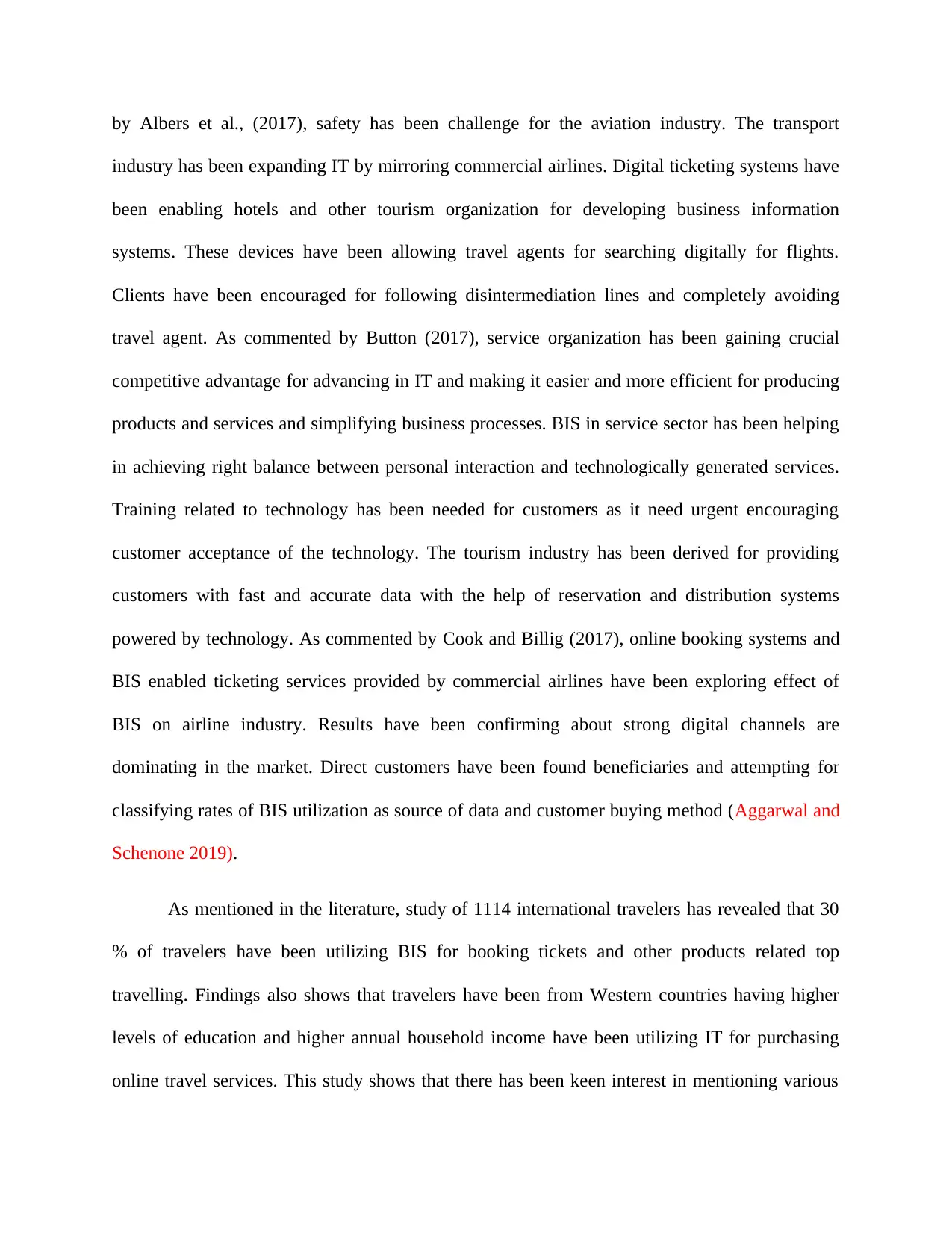
by Albers et al., (2017), safety has been challenge for the aviation industry. The transport
industry has been expanding IT by mirroring commercial airlines. Digital ticketing systems have
been enabling hotels and other tourism organization for developing business information
systems. These devices have been allowing travel agents for searching digitally for flights.
Clients have been encouraged for following disintermediation lines and completely avoiding
travel agent. As commented by Button (2017), service organization has been gaining crucial
competitive advantage for advancing in IT and making it easier and more efficient for producing
products and services and simplifying business processes. BIS in service sector has been helping
in achieving right balance between personal interaction and technologically generated services.
Training related to technology has been needed for customers as it need urgent encouraging
customer acceptance of the technology. The tourism industry has been derived for providing
customers with fast and accurate data with the help of reservation and distribution systems
powered by technology. As commented by Cook and Billig (2017), online booking systems and
BIS enabled ticketing services provided by commercial airlines have been exploring effect of
BIS on airline industry. Results have been confirming about strong digital channels are
dominating in the market. Direct customers have been found beneficiaries and attempting for
classifying rates of BIS utilization as source of data and customer buying method (Aggarwal and
Schenone 2019).
As mentioned in the literature, study of 1114 international travelers has revealed that 30
% of travelers have been utilizing BIS for booking tickets and other products related top
travelling. Findings also shows that travelers have been from Western countries having higher
levels of education and higher annual household income have been utilizing IT for purchasing
online travel services. This study shows that there has been keen interest in mentioning various
industry has been expanding IT by mirroring commercial airlines. Digital ticketing systems have
been enabling hotels and other tourism organization for developing business information
systems. These devices have been allowing travel agents for searching digitally for flights.
Clients have been encouraged for following disintermediation lines and completely avoiding
travel agent. As commented by Button (2017), service organization has been gaining crucial
competitive advantage for advancing in IT and making it easier and more efficient for producing
products and services and simplifying business processes. BIS in service sector has been helping
in achieving right balance between personal interaction and technologically generated services.
Training related to technology has been needed for customers as it need urgent encouraging
customer acceptance of the technology. The tourism industry has been derived for providing
customers with fast and accurate data with the help of reservation and distribution systems
powered by technology. As commented by Cook and Billig (2017), online booking systems and
BIS enabled ticketing services provided by commercial airlines have been exploring effect of
BIS on airline industry. Results have been confirming about strong digital channels are
dominating in the market. Direct customers have been found beneficiaries and attempting for
classifying rates of BIS utilization as source of data and customer buying method (Aggarwal and
Schenone 2019).
As mentioned in the literature, study of 1114 international travelers has revealed that 30
% of travelers have been utilizing BIS for booking tickets and other products related top
travelling. Findings also shows that travelers have been from Western countries having higher
levels of education and higher annual household income have been utilizing IT for purchasing
online travel services. This study shows that there has been keen interest in mentioning various
Paraphrase This Document
Need a fresh take? Get an instant paraphrase of this document with our AI Paraphraser
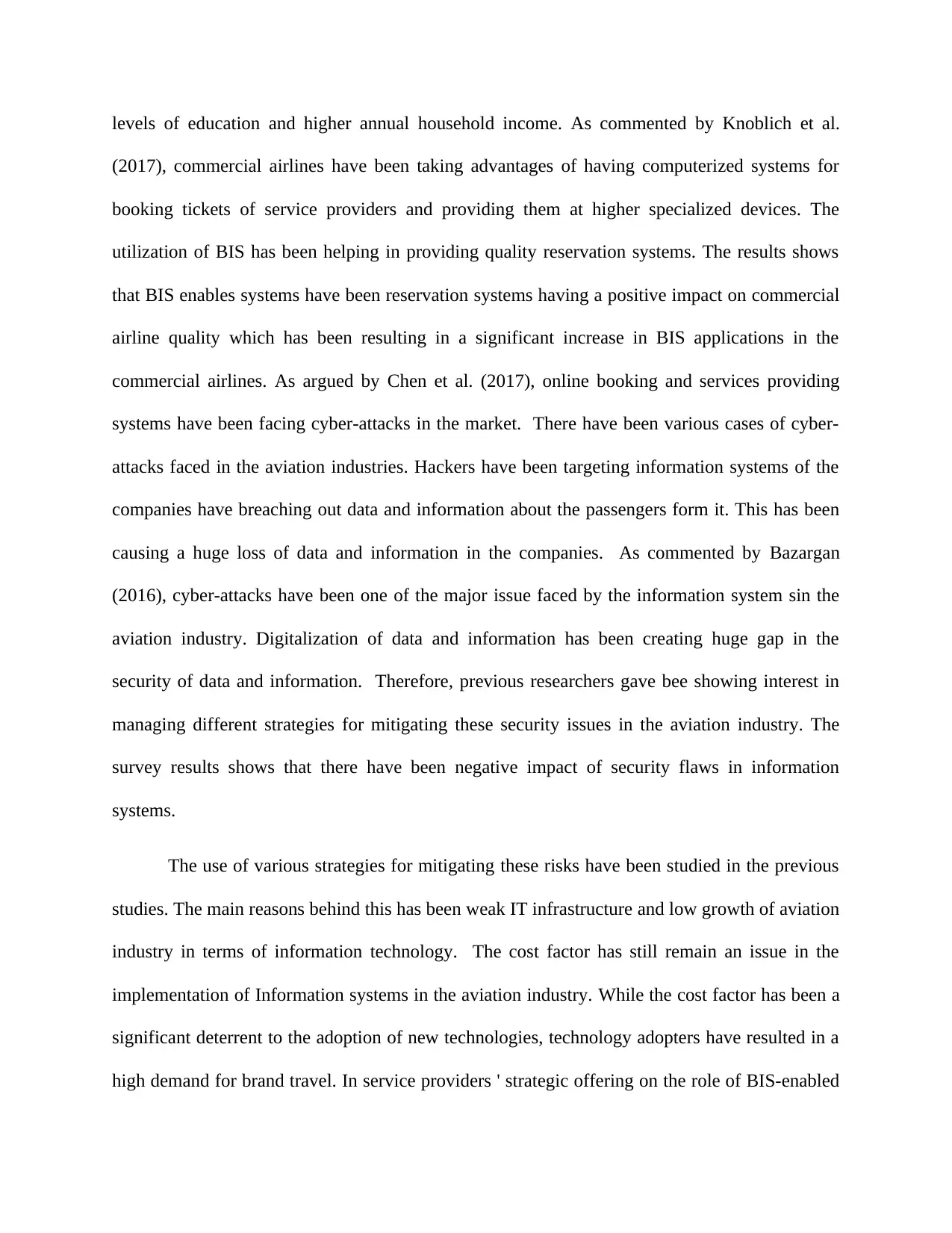
levels of education and higher annual household income. As commented by Knoblich et al.
(2017), commercial airlines have been taking advantages of having computerized systems for
booking tickets of service providers and providing them at higher specialized devices. The
utilization of BIS has been helping in providing quality reservation systems. The results shows
that BIS enables systems have been reservation systems having a positive impact on commercial
airline quality which has been resulting in a significant increase in BIS applications in the
commercial airlines. As argued by Chen et al. (2017), online booking and services providing
systems have been facing cyber-attacks in the market. There have been various cases of cyber-
attacks faced in the aviation industries. Hackers have been targeting information systems of the
companies have breaching out data and information about the passengers form it. This has been
causing a huge loss of data and information in the companies. As commented by Bazargan
(2016), cyber-attacks have been one of the major issue faced by the information system sin the
aviation industry. Digitalization of data and information has been creating huge gap in the
security of data and information. Therefore, previous researchers gave bee showing interest in
managing different strategies for mitigating these security issues in the aviation industry. The
survey results shows that there have been negative impact of security flaws in information
systems.
The use of various strategies for mitigating these risks have been studied in the previous
studies. The main reasons behind this has been weak IT infrastructure and low growth of aviation
industry in terms of information technology. The cost factor has still remain an issue in the
implementation of Information systems in the aviation industry. While the cost factor has been a
significant deterrent to the adoption of new technologies, technology adopters have resulted in a
high demand for brand travel. In service providers ' strategic offering on the role of BIS-enabled
(2017), commercial airlines have been taking advantages of having computerized systems for
booking tickets of service providers and providing them at higher specialized devices. The
utilization of BIS has been helping in providing quality reservation systems. The results shows
that BIS enables systems have been reservation systems having a positive impact on commercial
airline quality which has been resulting in a significant increase in BIS applications in the
commercial airlines. As argued by Chen et al. (2017), online booking and services providing
systems have been facing cyber-attacks in the market. There have been various cases of cyber-
attacks faced in the aviation industries. Hackers have been targeting information systems of the
companies have breaching out data and information about the passengers form it. This has been
causing a huge loss of data and information in the companies. As commented by Bazargan
(2016), cyber-attacks have been one of the major issue faced by the information system sin the
aviation industry. Digitalization of data and information has been creating huge gap in the
security of data and information. Therefore, previous researchers gave bee showing interest in
managing different strategies for mitigating these security issues in the aviation industry. The
survey results shows that there have been negative impact of security flaws in information
systems.
The use of various strategies for mitigating these risks have been studied in the previous
studies. The main reasons behind this has been weak IT infrastructure and low growth of aviation
industry in terms of information technology. The cost factor has still remain an issue in the
implementation of Information systems in the aviation industry. While the cost factor has been a
significant deterrent to the adoption of new technologies, technology adopters have resulted in a
high demand for brand travel. In service providers ' strategic offering on the role of BIS-enabled
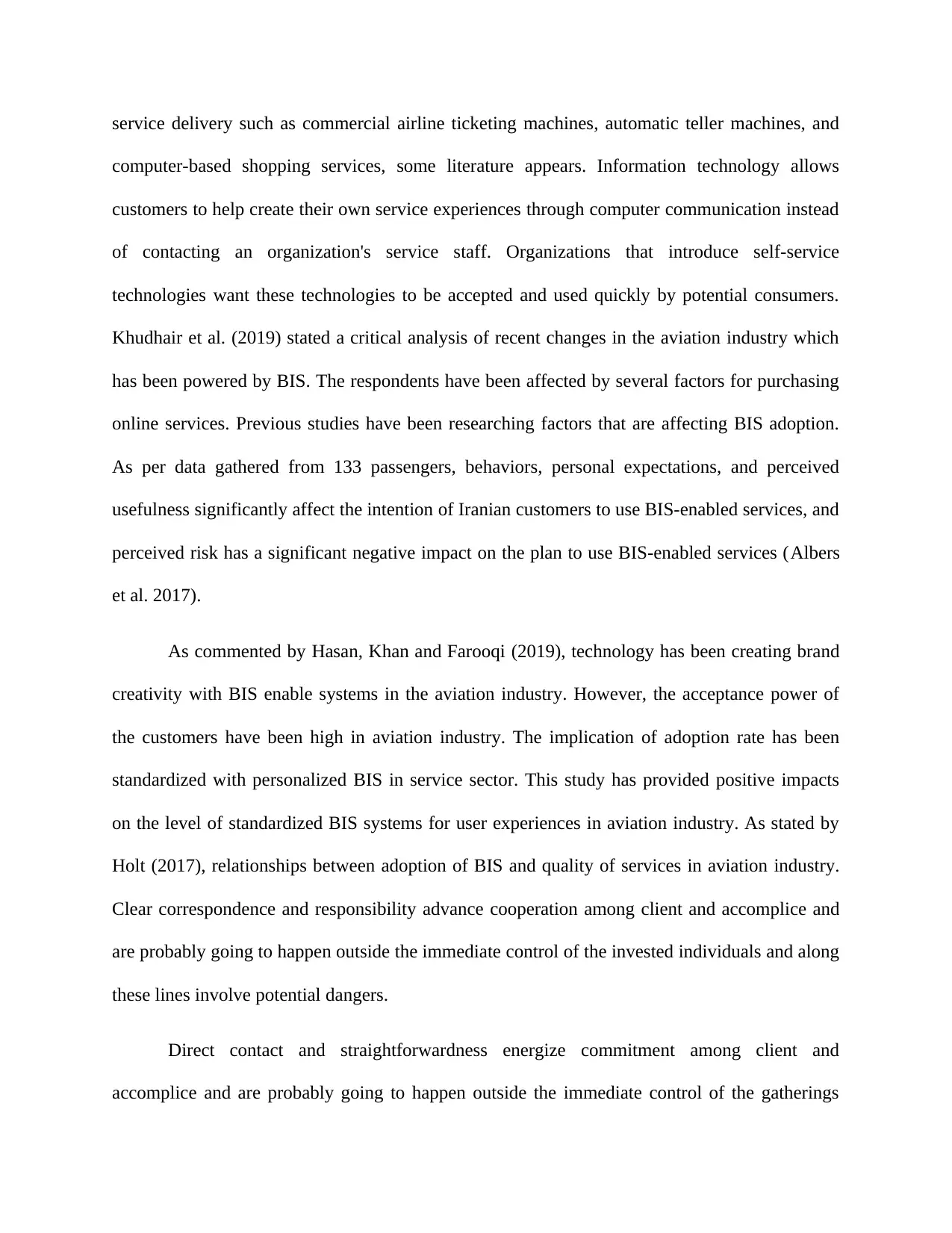
service delivery such as commercial airline ticketing machines, automatic teller machines, and
computer-based shopping services, some literature appears. Information technology allows
customers to help create their own service experiences through computer communication instead
of contacting an organization's service staff. Organizations that introduce self-service
technologies want these technologies to be accepted and used quickly by potential consumers.
Khudhair et al. (2019) stated a critical analysis of recent changes in the aviation industry which
has been powered by BIS. The respondents have been affected by several factors for purchasing
online services. Previous studies have been researching factors that are affecting BIS adoption.
As per data gathered from 133 passengers, behaviors, personal expectations, and perceived
usefulness significantly affect the intention of Iranian customers to use BIS-enabled services, and
perceived risk has a significant negative impact on the plan to use BIS-enabled services (Albers
et al. 2017).
As commented by Hasan, Khan and Farooqi (2019), technology has been creating brand
creativity with BIS enable systems in the aviation industry. However, the acceptance power of
the customers have been high in aviation industry. The implication of adoption rate has been
standardized with personalized BIS in service sector. This study has provided positive impacts
on the level of standardized BIS systems for user experiences in aviation industry. As stated by
Holt (2017), relationships between adoption of BIS and quality of services in aviation industry.
Clear correspondence and responsibility advance cooperation among client and accomplice and
are probably going to happen outside the immediate control of the invested individuals and along
these lines involve potential dangers.
Direct contact and straightforwardness energize commitment among client and
accomplice and are probably going to happen outside the immediate control of the gatherings
computer-based shopping services, some literature appears. Information technology allows
customers to help create their own service experiences through computer communication instead
of contacting an organization's service staff. Organizations that introduce self-service
technologies want these technologies to be accepted and used quickly by potential consumers.
Khudhair et al. (2019) stated a critical analysis of recent changes in the aviation industry which
has been powered by BIS. The respondents have been affected by several factors for purchasing
online services. Previous studies have been researching factors that are affecting BIS adoption.
As per data gathered from 133 passengers, behaviors, personal expectations, and perceived
usefulness significantly affect the intention of Iranian customers to use BIS-enabled services, and
perceived risk has a significant negative impact on the plan to use BIS-enabled services (Albers
et al. 2017).
As commented by Hasan, Khan and Farooqi (2019), technology has been creating brand
creativity with BIS enable systems in the aviation industry. However, the acceptance power of
the customers have been high in aviation industry. The implication of adoption rate has been
standardized with personalized BIS in service sector. This study has provided positive impacts
on the level of standardized BIS systems for user experiences in aviation industry. As stated by
Holt (2017), relationships between adoption of BIS and quality of services in aviation industry.
Clear correspondence and responsibility advance cooperation among client and accomplice and
are probably going to happen outside the immediate control of the invested individuals and along
these lines involve potential dangers.
Direct contact and straightforwardness energize commitment among client and
accomplice and are probably going to happen outside the immediate control of the gatherings
⊘ This is a preview!⊘
Do you want full access?
Subscribe today to unlock all pages.

Trusted by 1+ million students worldwide
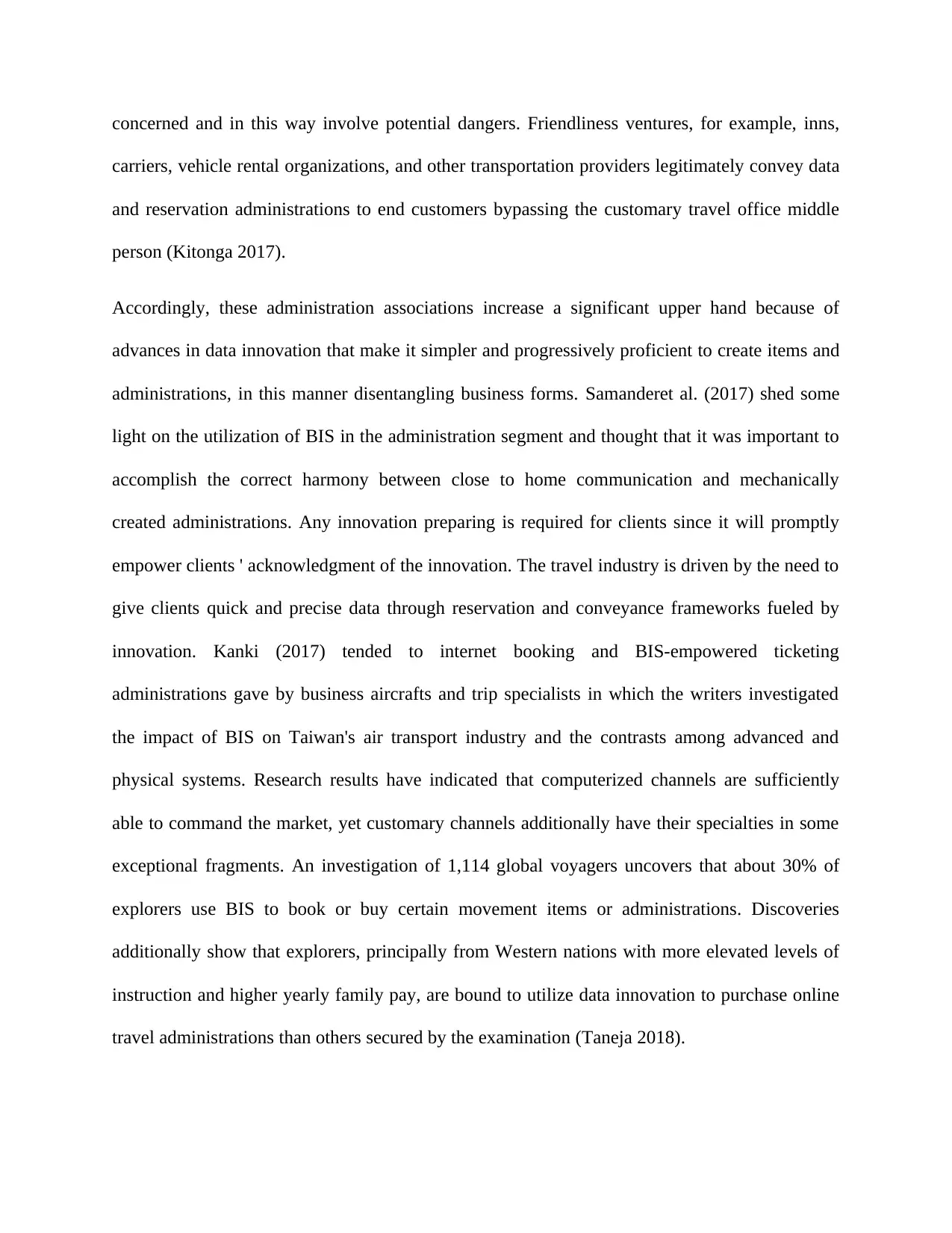
concerned and in this way involve potential dangers. Friendliness ventures, for example, inns,
carriers, vehicle rental organizations, and other transportation providers legitimately convey data
and reservation administrations to end customers bypassing the customary travel office middle
person (Kitonga 2017).
Accordingly, these administration associations increase a significant upper hand because of
advances in data innovation that make it simpler and progressively proficient to create items and
administrations, in this manner disentangling business forms. Samanderet al. (2017) shed some
light on the utilization of BIS in the administration segment and thought that it was important to
accomplish the correct harmony between close to home communication and mechanically
created administrations. Any innovation preparing is required for clients since it will promptly
empower clients ' acknowledgment of the innovation. The travel industry is driven by the need to
give clients quick and precise data through reservation and conveyance frameworks fueled by
innovation. Kanki (2017) tended to internet booking and BIS-empowered ticketing
administrations gave by business aircrafts and trip specialists in which the writers investigated
the impact of BIS on Taiwan's air transport industry and the contrasts among advanced and
physical systems. Research results have indicated that computerized channels are sufficiently
able to command the market, yet customary channels additionally have their specialties in some
exceptional fragments. An investigation of 1,114 global voyagers uncovers that about 30% of
explorers use BIS to book or buy certain movement items or administrations. Discoveries
additionally show that explorers, principally from Western nations with more elevated levels of
instruction and higher yearly family pay, are bound to utilize data innovation to purchase online
travel administrations than others secured by the examination (Taneja 2018).
carriers, vehicle rental organizations, and other transportation providers legitimately convey data
and reservation administrations to end customers bypassing the customary travel office middle
person (Kitonga 2017).
Accordingly, these administration associations increase a significant upper hand because of
advances in data innovation that make it simpler and progressively proficient to create items and
administrations, in this manner disentangling business forms. Samanderet al. (2017) shed some
light on the utilization of BIS in the administration segment and thought that it was important to
accomplish the correct harmony between close to home communication and mechanically
created administrations. Any innovation preparing is required for clients since it will promptly
empower clients ' acknowledgment of the innovation. The travel industry is driven by the need to
give clients quick and precise data through reservation and conveyance frameworks fueled by
innovation. Kanki (2017) tended to internet booking and BIS-empowered ticketing
administrations gave by business aircrafts and trip specialists in which the writers investigated
the impact of BIS on Taiwan's air transport industry and the contrasts among advanced and
physical systems. Research results have indicated that computerized channels are sufficiently
able to command the market, yet customary channels additionally have their specialties in some
exceptional fragments. An investigation of 1,114 global voyagers uncovers that about 30% of
explorers use BIS to book or buy certain movement items or administrations. Discoveries
additionally show that explorers, principally from Western nations with more elevated levels of
instruction and higher yearly family pay, are bound to utilize data innovation to purchase online
travel administrations than others secured by the examination (Taneja 2018).
Paraphrase This Document
Need a fresh take? Get an instant paraphrase of this document with our AI Paraphraser
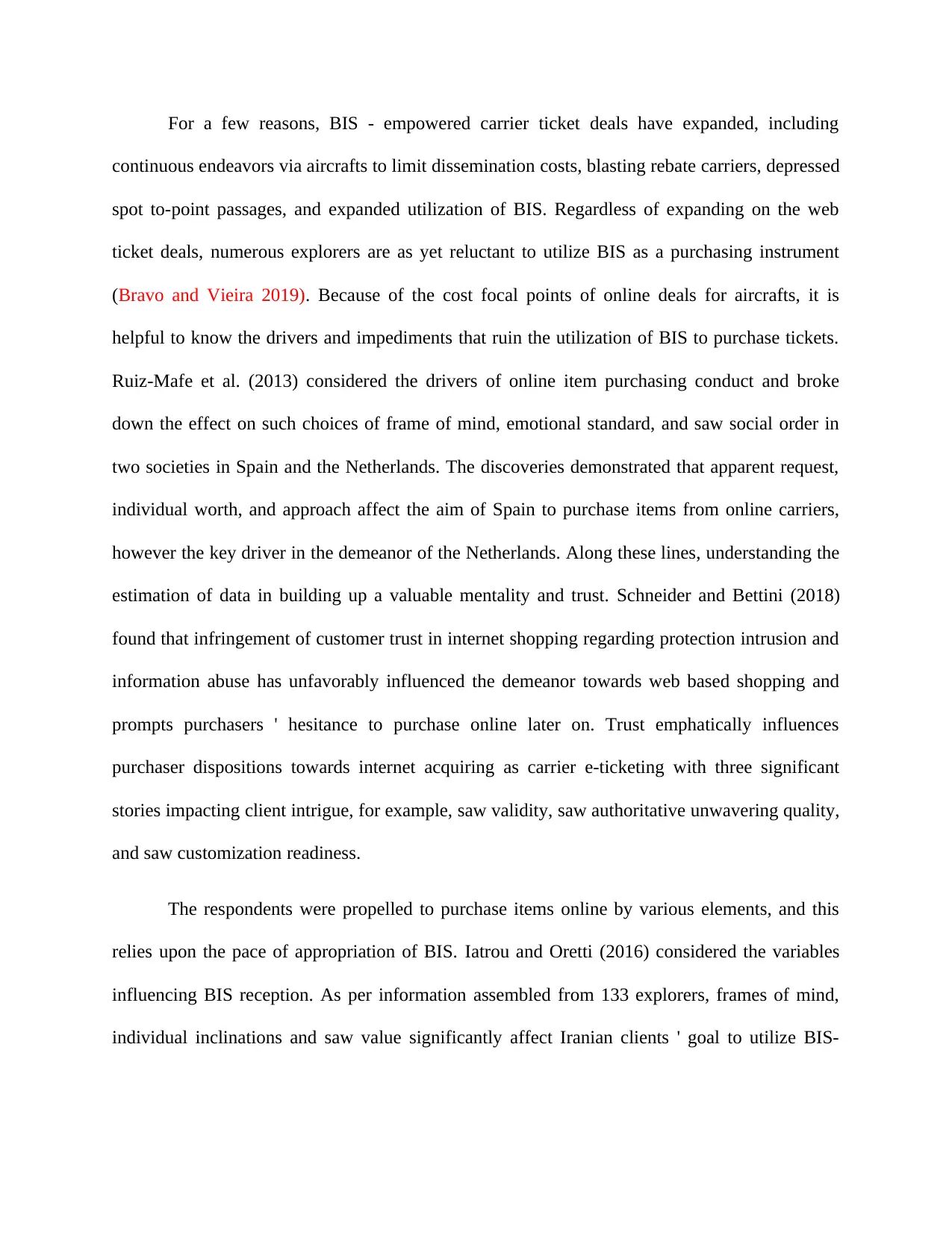
For a few reasons, BIS - empowered carrier ticket deals have expanded, including
continuous endeavors via aircrafts to limit dissemination costs, blasting rebate carriers, depressed
spot to-point passages, and expanded utilization of BIS. Regardless of expanding on the web
ticket deals, numerous explorers are as yet reluctant to utilize BIS as a purchasing instrument
(Bravo and Vieira 2019). Because of the cost focal points of online deals for aircrafts, it is
helpful to know the drivers and impediments that ruin the utilization of BIS to purchase tickets.
Ruiz-Mafe et al. (2013) considered the drivers of online item purchasing conduct and broke
down the effect on such choices of frame of mind, emotional standard, and saw social order in
two societies in Spain and the Netherlands. The discoveries demonstrated that apparent request,
individual worth, and approach affect the aim of Spain to purchase items from online carriers,
however the key driver in the demeanor of the Netherlands. Along these lines, understanding the
estimation of data in building up a valuable mentality and trust. Schneider and Bettini (2018)
found that infringement of customer trust in internet shopping regarding protection intrusion and
information abuse has unfavorably influenced the demeanor towards web based shopping and
prompts purchasers ' hesitance to purchase online later on. Trust emphatically influences
purchaser dispositions towards internet acquiring as carrier e-ticketing with three significant
stories impacting client intrigue, for example, saw validity, saw authoritative unwavering quality,
and saw customization readiness.
The respondents were propelled to purchase items online by various elements, and this
relies upon the pace of appropriation of BIS. Iatrou and Oretti (2016) considered the variables
influencing BIS reception. As per information assembled from 133 explorers, frames of mind,
individual inclinations and saw value significantly affect Iranian clients ' goal to utilize BIS-
continuous endeavors via aircrafts to limit dissemination costs, blasting rebate carriers, depressed
spot to-point passages, and expanded utilization of BIS. Regardless of expanding on the web
ticket deals, numerous explorers are as yet reluctant to utilize BIS as a purchasing instrument
(Bravo and Vieira 2019). Because of the cost focal points of online deals for aircrafts, it is
helpful to know the drivers and impediments that ruin the utilization of BIS to purchase tickets.
Ruiz-Mafe et al. (2013) considered the drivers of online item purchasing conduct and broke
down the effect on such choices of frame of mind, emotional standard, and saw social order in
two societies in Spain and the Netherlands. The discoveries demonstrated that apparent request,
individual worth, and approach affect the aim of Spain to purchase items from online carriers,
however the key driver in the demeanor of the Netherlands. Along these lines, understanding the
estimation of data in building up a valuable mentality and trust. Schneider and Bettini (2018)
found that infringement of customer trust in internet shopping regarding protection intrusion and
information abuse has unfavorably influenced the demeanor towards web based shopping and
prompts purchasers ' hesitance to purchase online later on. Trust emphatically influences
purchaser dispositions towards internet acquiring as carrier e-ticketing with three significant
stories impacting client intrigue, for example, saw validity, saw authoritative unwavering quality,
and saw customization readiness.
The respondents were propelled to purchase items online by various elements, and this
relies upon the pace of appropriation of BIS. Iatrou and Oretti (2016) considered the variables
influencing BIS reception. As per information assembled from 133 explorers, frames of mind,
individual inclinations and saw value significantly affect Iranian clients ' goal to utilize BIS-
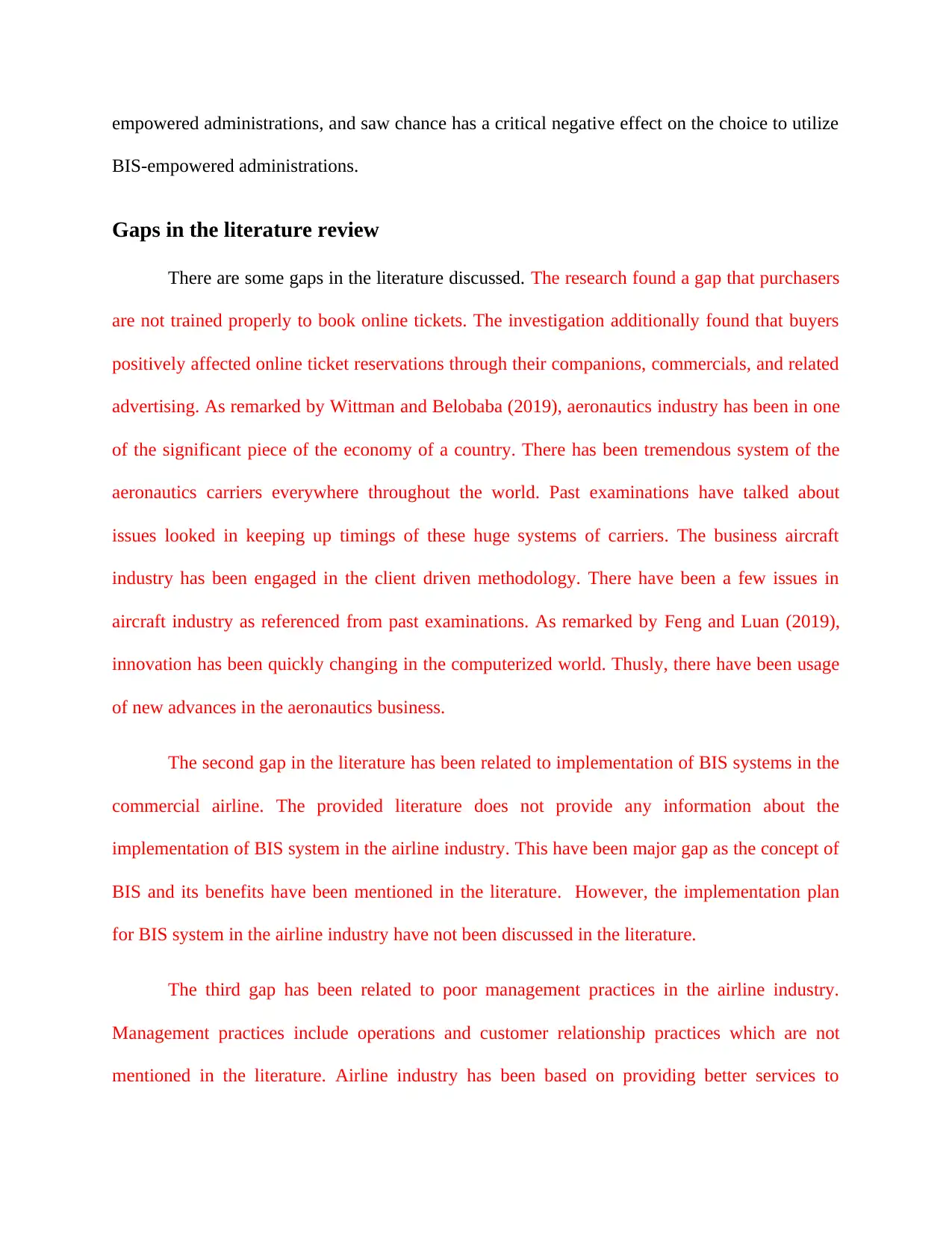
empowered administrations, and saw chance has a critical negative effect on the choice to utilize
BIS-empowered administrations.
Gaps in the literature review
There are some gaps in the literature discussed. The research found a gap that purchasers
are not trained properly to book online tickets. The investigation additionally found that buyers
positively affected online ticket reservations through their companions, commercials, and related
advertising. As remarked by Wittman and Belobaba (2019), aeronautics industry has been in one
of the significant piece of the economy of a country. There has been tremendous system of the
aeronautics carriers everywhere throughout the world. Past examinations have talked about
issues looked in keeping up timings of these huge systems of carriers. The business aircraft
industry has been engaged in the client driven methodology. There have been a few issues in
aircraft industry as referenced from past examinations. As remarked by Feng and Luan (2019),
innovation has been quickly changing in the computerized world. Thusly, there have been usage
of new advances in the aeronautics business.
The second gap in the literature has been related to implementation of BIS systems in the
commercial airline. The provided literature does not provide any information about the
implementation of BIS system in the airline industry. This have been major gap as the concept of
BIS and its benefits have been mentioned in the literature. However, the implementation plan
for BIS system in the airline industry have not been discussed in the literature.
The third gap has been related to poor management practices in the airline industry.
Management practices include operations and customer relationship practices which are not
mentioned in the literature. Airline industry has been based on providing better services to
BIS-empowered administrations.
Gaps in the literature review
There are some gaps in the literature discussed. The research found a gap that purchasers
are not trained properly to book online tickets. The investigation additionally found that buyers
positively affected online ticket reservations through their companions, commercials, and related
advertising. As remarked by Wittman and Belobaba (2019), aeronautics industry has been in one
of the significant piece of the economy of a country. There has been tremendous system of the
aeronautics carriers everywhere throughout the world. Past examinations have talked about
issues looked in keeping up timings of these huge systems of carriers. The business aircraft
industry has been engaged in the client driven methodology. There have been a few issues in
aircraft industry as referenced from past examinations. As remarked by Feng and Luan (2019),
innovation has been quickly changing in the computerized world. Thusly, there have been usage
of new advances in the aeronautics business.
The second gap in the literature has been related to implementation of BIS systems in the
commercial airline. The provided literature does not provide any information about the
implementation of BIS system in the airline industry. This have been major gap as the concept of
BIS and its benefits have been mentioned in the literature. However, the implementation plan
for BIS system in the airline industry have not been discussed in the literature.
The third gap has been related to poor management practices in the airline industry.
Management practices include operations and customer relationship practices which are not
mentioned in the literature. Airline industry has been based on providing better services to
⊘ This is a preview!⊘
Do you want full access?
Subscribe today to unlock all pages.

Trusted by 1+ million students worldwide
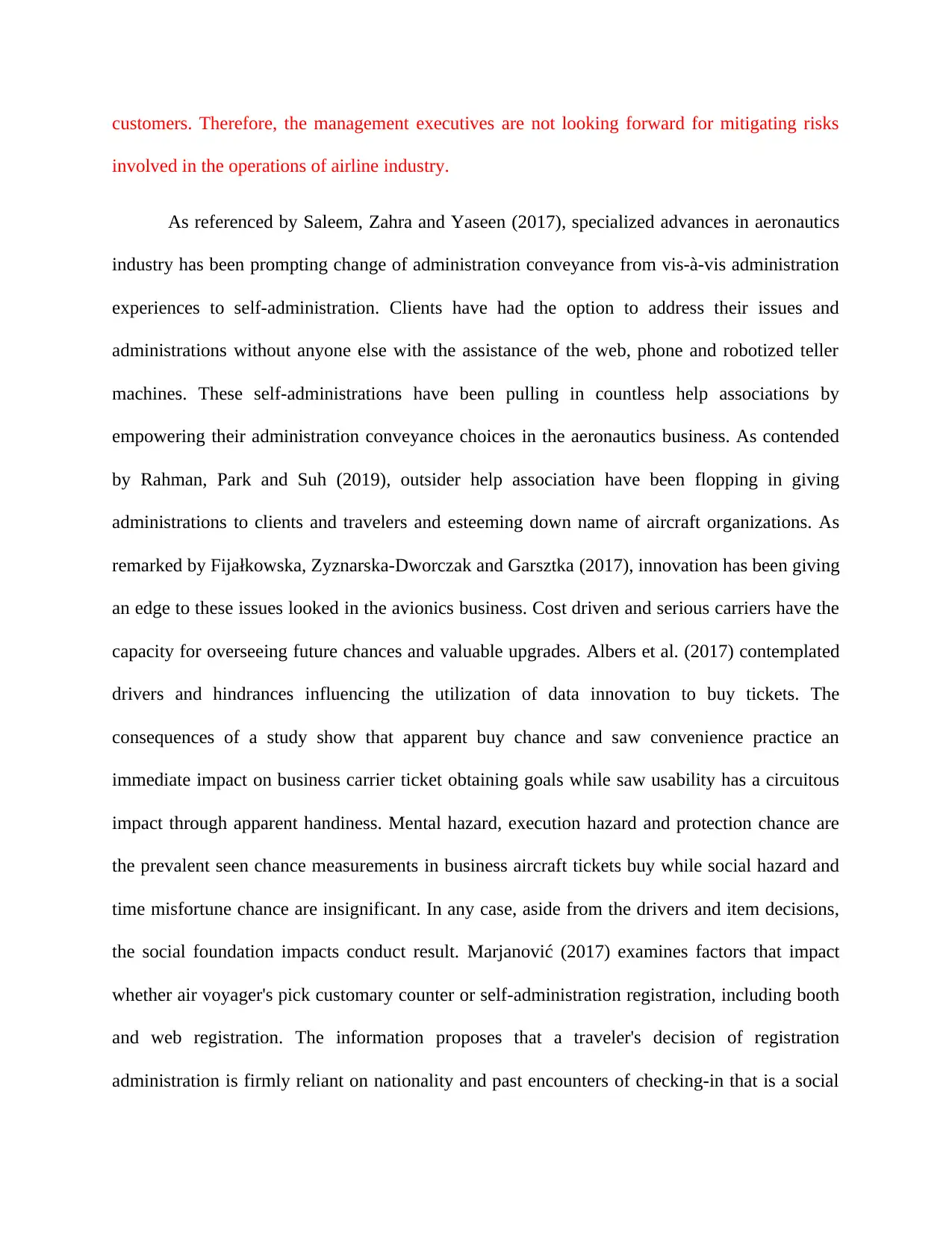
customers. Therefore, the management executives are not looking forward for mitigating risks
involved in the operations of airline industry.
As referenced by Saleem, Zahra and Yaseen (2017), specialized advances in aeronautics
industry has been prompting change of administration conveyance from vis-à-vis administration
experiences to self-administration. Clients have had the option to address their issues and
administrations without anyone else with the assistance of the web, phone and robotized teller
machines. These self-administrations have been pulling in countless help associations by
empowering their administration conveyance choices in the aeronautics business. As contended
by Rahman, Park and Suh (2019), outsider help association have been flopping in giving
administrations to clients and travelers and esteeming down name of aircraft organizations. As
remarked by Fijałkowska, Zyznarska-Dworczak and Garsztka (2017), innovation has been giving
an edge to these issues looked in the avionics business. Cost driven and serious carriers have the
capacity for overseeing future chances and valuable upgrades. Albers et al. (2017) contemplated
drivers and hindrances influencing the utilization of data innovation to buy tickets. The
consequences of a study show that apparent buy chance and saw convenience practice an
immediate impact on business carrier ticket obtaining goals while saw usability has a circuitous
impact through apparent handiness. Mental hazard, execution hazard and protection chance are
the prevalent seen chance measurements in business aircraft tickets buy while social hazard and
time misfortune chance are insignificant. In any case, aside from the drivers and item decisions,
the social foundation impacts conduct result. Marjanović (2017) examines factors that impact
whether air voyager's pick customary counter or self-administration registration, including booth
and web registration. The information proposes that a traveler's decision of registration
administration is firmly reliant on nationality and past encounters of checking-in that is a social
involved in the operations of airline industry.
As referenced by Saleem, Zahra and Yaseen (2017), specialized advances in aeronautics
industry has been prompting change of administration conveyance from vis-à-vis administration
experiences to self-administration. Clients have had the option to address their issues and
administrations without anyone else with the assistance of the web, phone and robotized teller
machines. These self-administrations have been pulling in countless help associations by
empowering their administration conveyance choices in the aeronautics business. As contended
by Rahman, Park and Suh (2019), outsider help association have been flopping in giving
administrations to clients and travelers and esteeming down name of aircraft organizations. As
remarked by Fijałkowska, Zyznarska-Dworczak and Garsztka (2017), innovation has been giving
an edge to these issues looked in the avionics business. Cost driven and serious carriers have the
capacity for overseeing future chances and valuable upgrades. Albers et al. (2017) contemplated
drivers and hindrances influencing the utilization of data innovation to buy tickets. The
consequences of a study show that apparent buy chance and saw convenience practice an
immediate impact on business carrier ticket obtaining goals while saw usability has a circuitous
impact through apparent handiness. Mental hazard, execution hazard and protection chance are
the prevalent seen chance measurements in business aircraft tickets buy while social hazard and
time misfortune chance are insignificant. In any case, aside from the drivers and item decisions,
the social foundation impacts conduct result. Marjanović (2017) examines factors that impact
whether air voyager's pick customary counter or self-administration registration, including booth
and web registration. The information proposes that a traveler's decision of registration
administration is firmly reliant on nationality and past encounters of checking-in that is a social
Paraphrase This Document
Need a fresh take? Get an instant paraphrase of this document with our AI Paraphraser
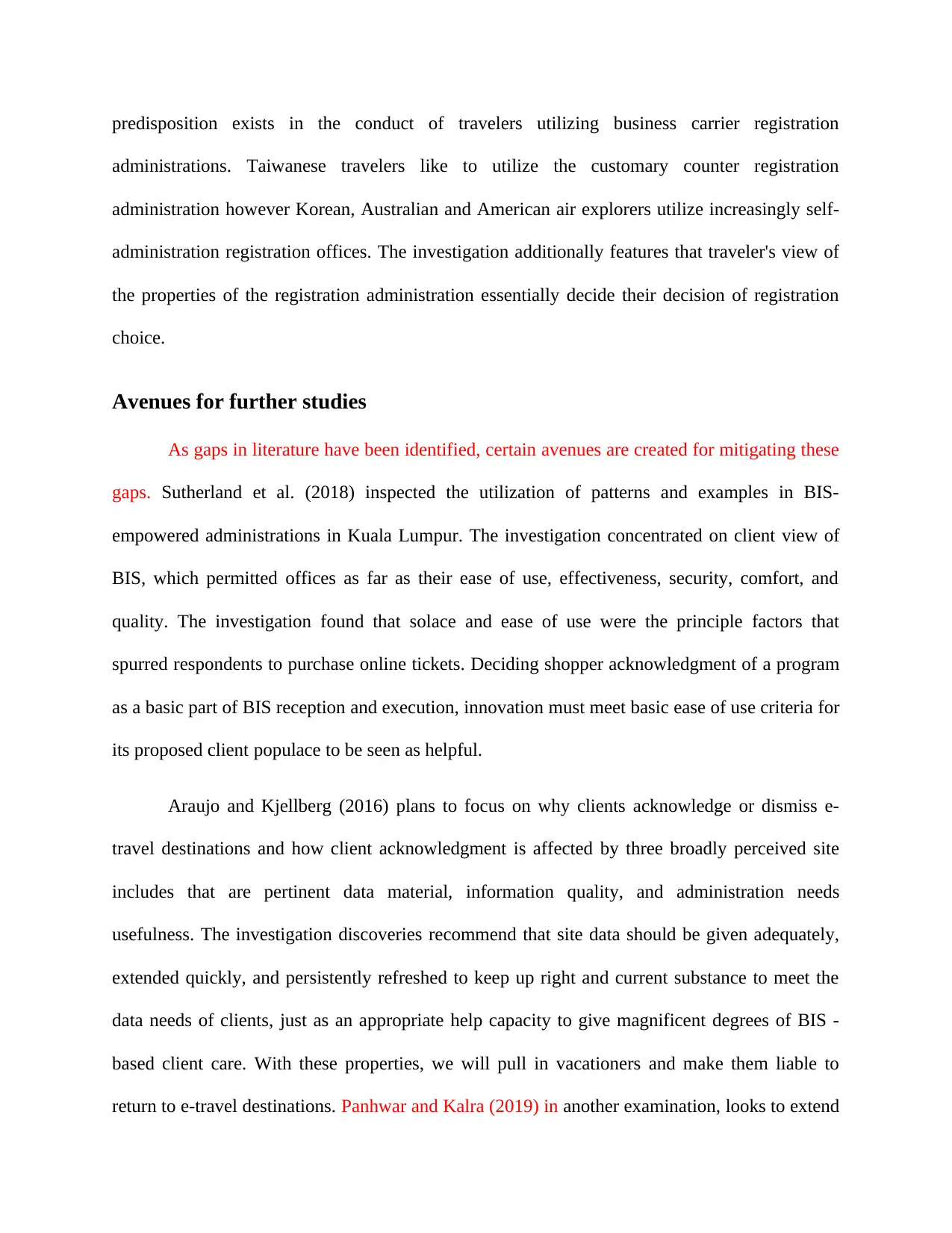
predisposition exists in the conduct of travelers utilizing business carrier registration
administrations. Taiwanese travelers like to utilize the customary counter registration
administration however Korean, Australian and American air explorers utilize increasingly self-
administration registration offices. The investigation additionally features that traveler's view of
the properties of the registration administration essentially decide their decision of registration
choice.
Avenues for further studies
As gaps in literature have been identified, certain avenues are created for mitigating these
gaps. Sutherland et al. (2018) inspected the utilization of patterns and examples in BIS-
empowered administrations in Kuala Lumpur. The investigation concentrated on client view of
BIS, which permitted offices as far as their ease of use, effectiveness, security, comfort, and
quality. The investigation found that solace and ease of use were the principle factors that
spurred respondents to purchase online tickets. Deciding shopper acknowledgment of a program
as a basic part of BIS reception and execution, innovation must meet basic ease of use criteria for
its proposed client populace to be seen as helpful.
Araujo and Kjellberg (2016) plans to focus on why clients acknowledge or dismiss e-
travel destinations and how client acknowledgment is affected by three broadly perceived site
includes that are pertinent data material, information quality, and administration needs
usefulness. The investigation discoveries recommend that site data should be given adequately,
extended quickly, and persistently refreshed to keep up right and current substance to meet the
data needs of clients, just as an appropriate help capacity to give magnificent degrees of BIS -
based client care. With these properties, we will pull in vacationers and make them liable to
return to e-travel destinations. Panhwar and Kalra (2019) in another examination, looks to extend
administrations. Taiwanese travelers like to utilize the customary counter registration
administration however Korean, Australian and American air explorers utilize increasingly self-
administration registration offices. The investigation additionally features that traveler's view of
the properties of the registration administration essentially decide their decision of registration
choice.
Avenues for further studies
As gaps in literature have been identified, certain avenues are created for mitigating these
gaps. Sutherland et al. (2018) inspected the utilization of patterns and examples in BIS-
empowered administrations in Kuala Lumpur. The investigation concentrated on client view of
BIS, which permitted offices as far as their ease of use, effectiveness, security, comfort, and
quality. The investigation found that solace and ease of use were the principle factors that
spurred respondents to purchase online tickets. Deciding shopper acknowledgment of a program
as a basic part of BIS reception and execution, innovation must meet basic ease of use criteria for
its proposed client populace to be seen as helpful.
Araujo and Kjellberg (2016) plans to focus on why clients acknowledge or dismiss e-
travel destinations and how client acknowledgment is affected by three broadly perceived site
includes that are pertinent data material, information quality, and administration needs
usefulness. The investigation discoveries recommend that site data should be given adequately,
extended quickly, and persistently refreshed to keep up right and current substance to meet the
data needs of clients, just as an appropriate help capacity to give magnificent degrees of BIS -
based client care. With these properties, we will pull in vacationers and make them liable to
return to e-travel destinations. Panhwar and Kalra (2019) in another examination, looks to extend
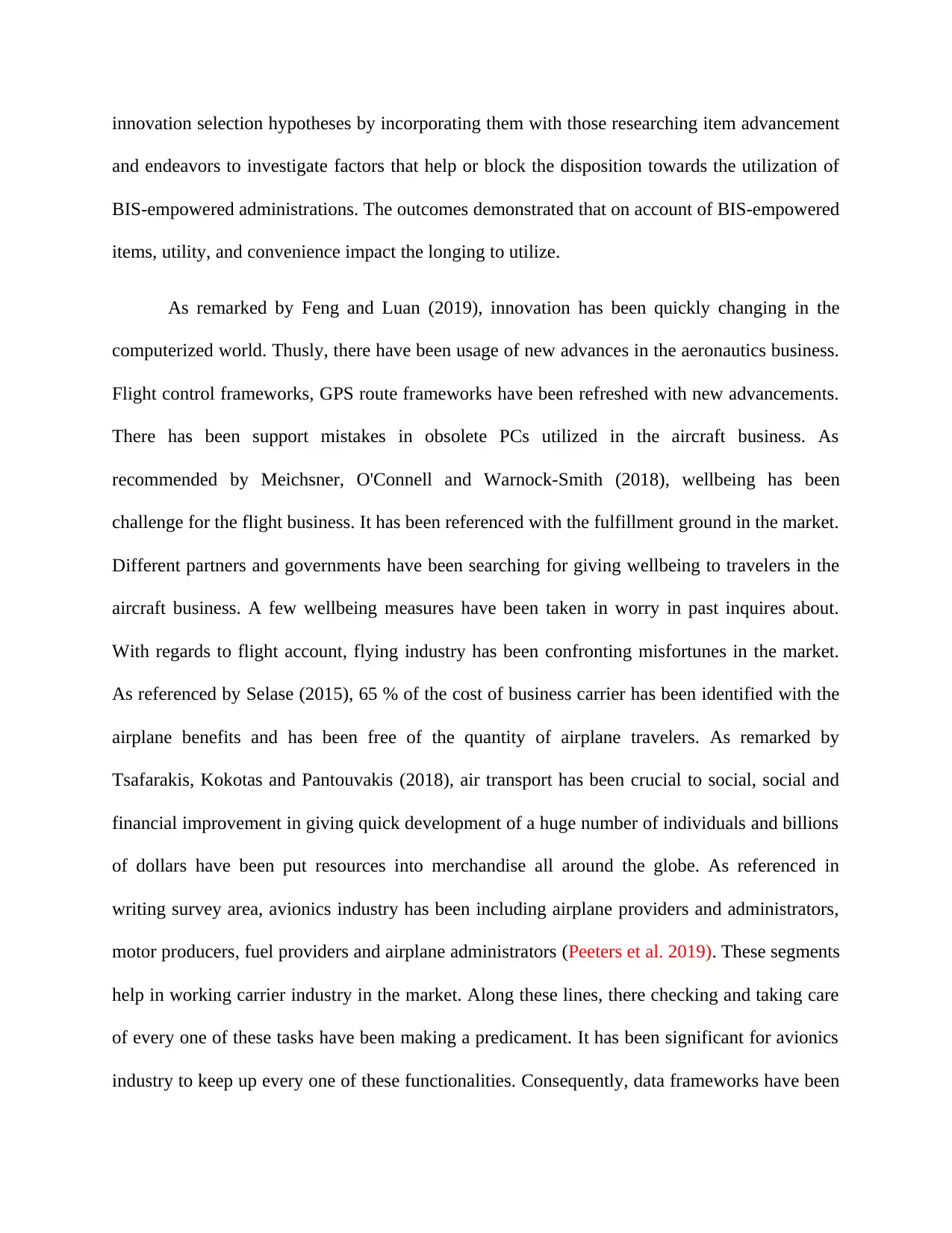
innovation selection hypotheses by incorporating them with those researching item advancement
and endeavors to investigate factors that help or block the disposition towards the utilization of
BIS-empowered administrations. The outcomes demonstrated that on account of BIS-empowered
items, utility, and convenience impact the longing to utilize.
As remarked by Feng and Luan (2019), innovation has been quickly changing in the
computerized world. Thusly, there have been usage of new advances in the aeronautics business.
Flight control frameworks, GPS route frameworks have been refreshed with new advancements.
There has been support mistakes in obsolete PCs utilized in the aircraft business. As
recommended by Meichsner, O'Connell and Warnock-Smith (2018), wellbeing has been
challenge for the flight business. It has been referenced with the fulfillment ground in the market.
Different partners and governments have been searching for giving wellbeing to travelers in the
aircraft business. A few wellbeing measures have been taken in worry in past inquires about.
With regards to flight account, flying industry has been confronting misfortunes in the market.
As referenced by Selase (2015), 65 % of the cost of business carrier has been identified with the
airplane benefits and has been free of the quantity of airplane travelers. As remarked by
Tsafarakis, Kokotas and Pantouvakis (2018), air transport has been crucial to social, social and
financial improvement in giving quick development of a huge number of individuals and billions
of dollars have been put resources into merchandise all around the globe. As referenced in
writing survey area, avionics industry has been including airplane providers and administrators,
motor producers, fuel providers and airplane administrators (Peeters et al. 2019). These segments
help in working carrier industry in the market. Along these lines, there checking and taking care
of every one of these tasks have been making a predicament. It has been significant for avionics
industry to keep up every one of these functionalities. Consequently, data frameworks have been
and endeavors to investigate factors that help or block the disposition towards the utilization of
BIS-empowered administrations. The outcomes demonstrated that on account of BIS-empowered
items, utility, and convenience impact the longing to utilize.
As remarked by Feng and Luan (2019), innovation has been quickly changing in the
computerized world. Thusly, there have been usage of new advances in the aeronautics business.
Flight control frameworks, GPS route frameworks have been refreshed with new advancements.
There has been support mistakes in obsolete PCs utilized in the aircraft business. As
recommended by Meichsner, O'Connell and Warnock-Smith (2018), wellbeing has been
challenge for the flight business. It has been referenced with the fulfillment ground in the market.
Different partners and governments have been searching for giving wellbeing to travelers in the
aircraft business. A few wellbeing measures have been taken in worry in past inquires about.
With regards to flight account, flying industry has been confronting misfortunes in the market.
As referenced by Selase (2015), 65 % of the cost of business carrier has been identified with the
airplane benefits and has been free of the quantity of airplane travelers. As remarked by
Tsafarakis, Kokotas and Pantouvakis (2018), air transport has been crucial to social, social and
financial improvement in giving quick development of a huge number of individuals and billions
of dollars have been put resources into merchandise all around the globe. As referenced in
writing survey area, avionics industry has been including airplane providers and administrators,
motor producers, fuel providers and airplane administrators (Peeters et al. 2019). These segments
help in working carrier industry in the market. Along these lines, there checking and taking care
of every one of these tasks have been making a predicament. It has been significant for avionics
industry to keep up every one of these functionalities. Consequently, data frameworks have been
⊘ This is a preview!⊘
Do you want full access?
Subscribe today to unlock all pages.

Trusted by 1+ million students worldwide
1 out of 17
Related Documents
Your All-in-One AI-Powered Toolkit for Academic Success.
+13062052269
info@desklib.com
Available 24*7 on WhatsApp / Email
![[object Object]](/_next/static/media/star-bottom.7253800d.svg)
Unlock your academic potential
Copyright © 2020–2025 A2Z Services. All Rights Reserved. Developed and managed by ZUCOL.





